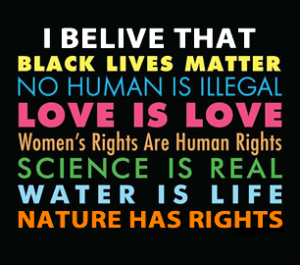Overpopulation Myths – Ideology vs Reality
Oh population and environmental politics, such a messy set of bedfellows.
Here I want to respond to a recent AJ+ video by Sana Saeed on what she calls the “overpopulation myth” and its historical arc. I appreciate Saeed addressing this important topic in the video, and there is a lot of important historical context that she covers which I suspect many people may not be aware of, or perhaps are only marginally aware of at best.
 At the same time, I feel the video still manages to advance the false narrative that overpopulation is not a real problem, but rather largely a produce of racist and xenophobic political ideologies dating back to the 1800s. The argument begins with the tired old trope of Malthusian economics to dismiss a valid worry, and paints advocates of overpopulation as a real issue in a singular light as if they are all the same. Yes, Madison Grant and others of his ilk were racist with a regressive social agenda. And yes, Paul Ehrlich got his Population Bomb claims wrong back in the 1960s. As I said, the history behind many of the overpopulation fear tactics that Saeed touch on are important to understand.
At the same time, I feel the video still manages to advance the false narrative that overpopulation is not a real problem, but rather largely a produce of racist and xenophobic political ideologies dating back to the 1800s. The argument begins with the tired old trope of Malthusian economics to dismiss a valid worry, and paints advocates of overpopulation as a real issue in a singular light as if they are all the same. Yes, Madison Grant and others of his ilk were racist with a regressive social agenda. And yes, Paul Ehrlich got his Population Bomb claims wrong back in the 1960s. As I said, the history behind many of the overpopulation fear tactics that Saeed touch on are important to understand.
But the claim that endless population growth is unsustainable can, and does, exist independent of this historical baggage. That’s the point that this video misses, and in fact, actually tries to dismiss. And that’s where my concerns lie.
You don’t need racism or xenophobia or eugenics to reach the conclusion that we have too many people on the Earth. All you need to do is read the latest UN IPCC climate synthesis reports (AR6 at this point in 2022). And you don’t need to single out people from Asia, Africa, or Latin America as the culprits. All you need is a basic grasp of the ecological concept of carrying capacity to know that endless growth and resource consumption within a finite system (aka planet Earth) is unsustainable, period. This is a basic law of nature. No amount of techno-utopianism or scientific engineering can get us around this fact, despite claims to the contrary often made by cheerleaders of the “Green Revolution” or transhumanism.
The problem driving the climate crisis is too many people AND too much consumption. Saeed rightly highlights the massive footprint from highly industrialized countries as the main culprit behind climate change, a point on which there is 99.9% scientific consensus. Yet the overall degradation of our planetary biosphere is due to an neoliberal economic model, embodied in globalization, which underlies and drives the process we have come to refer to as modernity (industrial agriculture, plastics, mass production, increased energy usage, etc.), all of which would continue with or without eugenics, racism, or xenophobia.
We don’t have to embrace eco-fascism to accept this basic ecological claim. We can easily criticize the Fords and Gates and billionaire philanthropists of the world for all of their misguided politics as this video does, but this still doesn’t change the basic calculus of a finite planet. This misguided argument that population isn’t really the “real” issue can be seen most clearly near the end of the video:
It is to say, however, that even those who have presented themselves with the best of intentions for the development of impoverished and struggling postcolonial countries have done so based on beliefs about populations rooted in the same ideas that were foundational to 20th century fascism. If the climate emergency is going to be the defining crisis of our time, that impacts everything from migration to food security, then we’re going to need to find a way to talk about it without casually strolling into the trap of the overpopulation myth, a myth embraced by the far-right and propelled by the most liberal of our institutions.
Perpetuating Myths
The logical fallacy that Saeed advances in this video can be seen in a telling remark where she discusses how to address the climate crisis without falling into the trap of the “overpopulation myth”:
Better coverage also begins with being accurate about the causes of the climate crisis, about who is responsible. Because when we talk about how the world is too populated, it assumes that all people live equally and thus have an equal impact on the environment.
While this claim might have merit for mainstream political discourse and liberal environmentalists who love the Gates and Fords of this world, if you spend any time in critical environmental justice circles you know this argument is nonsense. Of course Anglo-Americans nations (especially the US) are the chief agents driving climate destruction, due to a high energy, high waste lifestyle and the underlying system of extractive capitalism that sustains it. No one disputes this. In fact, the EJ crowd has been making this argument for decades.
Overpopulation is a problem, just not a racial one. This is the key point that the “overpopulation myth” debunking misses. This matters because this is where the ideological fork in the road becomes clear: Eco-fascism goes to the right, political ecology goes to the left.
Dramatically decreasing resource consumption among the 10% who use +50% of the Earth’s resources still only goes so far in addressing the underlying problem of global resource usage. At best it simply kicks the collapse down the road, leaving a future generation to deal with the mess. At worst, it ignores the growing reality of a catastrophic collapse of industrialization due to its inherently unsustainable structure. The video suggests one of the core problems is a globalized industrial economy, yet it ironically fails to mention that this is precisely the model that the entire world is striving towards–even more people using even more resources!
So we can (and should) criticize the lavish lifestyle of consumers in highly industrialized countries while also pushing for reduced global population growth–it’s not an either/or zero sum game. Advancing both critiques simultaneously helps us avoid the trap of ecological displacement that one of the expert talks about in the video (i.e., it’s not “us” Anglo-Americas who are the problem, it’s “them” (POCs in LA/Africa/Asia) that are the real problem) while acknowledging that the issue is real, and not just a reactionary right-wing trope.
 There’s a reason many Earth Systems scientists argue we are already consuming resources that exceed those on the planet (by at least 1.5 X according to some), even after taking into account variances and uncertainty between biophysical and social carrying capacities and the role of technological mediation.*
There’s a reason many Earth Systems scientists argue we are already consuming resources that exceed those on the planet (by at least 1.5 X according to some), even after taking into account variances and uncertainty between biophysical and social carrying capacities and the role of technological mediation.*
I also found it perplexing that despite being a nearly 30 minute video, capitalism (and extractive capitalism in particular) was never mentioned. That fact that you can have a 30 minute video on the climate crisis and not talk about capitalism is another blind spot in this analysis.
It’s also noteworthy that AJ+ didn’t bother to talk to any ecologists or Earth Systems scientists who could have addresses issues of carrying capacity, overpopulation, planetary boundaries, and the like. Scientists in any of these fields could speak to why the “population myth” is not actually a myth, at least not as far as the basic science of resource use and its limits is concerned.
So while I’m entirely supportive of debunking the racialized abuses of population that have and continue to occur, to my mind this is another case of tossing out the baby with the bathwater. We can’t lose sight of the underlying system that is devouring the planet, and population will always be one part of that story.
* For the sake of this argument I don’t consider space colonization because it’s simply not realistic at this point and it doesn’t change the basic point about the limit of Earth’s finite resources.


